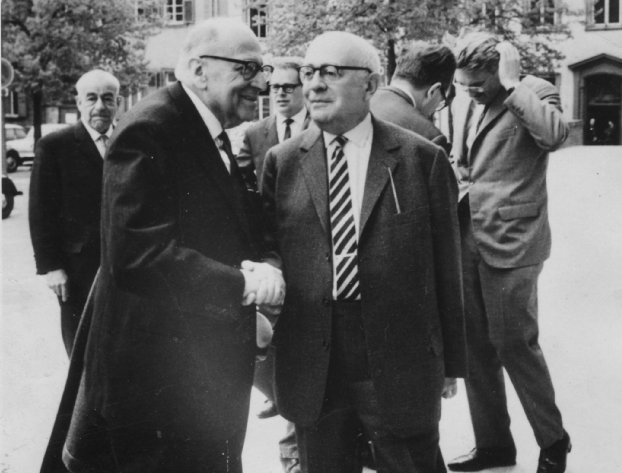Max Horkheimer

Max Horkheimer (February 14, 1895 – July 7, 1973) was a Jewish-German philosopher and sociologist, a founder and guiding thinker of the Frankfurt School/critical theory.
Biography
Horkheimer was born in Stuttgart to an assimilated Jewish family; due to parental pressure, he did not initially pursue an academic career, leaving secondary school at the age of sixteen to work in his father's factory. After World War I, however, he enrolled at Munich University, where he studied philosophy and psychology. He subsequently moved to Frankfurt am Main, where he studied under Hans Cornelius. There he met Theodor Adorno, many years his junior, with whom he would strike a lasting friendship and a fruitful collaborative relationship.
In 1925 he was habilitated with a dissertation entitled Kant's Critique of Judgement as Mediation between Practical and Theoretical Philosophy written under Cornelius. He was appointed Privatdozent the following year. When the Institute for Social Research's directorship became vacant in 1930, he was elected to the position. The following year publication of the Institute's Zeitschrift für Sozialforschung began, with Horkheimer as its editor.
In 1933 his venia legendi was revoked by the new Nazi government, and the Institute closed. Horkheimer emigrated to Switzerland, from where he would leave for the USA the following year, where Columbia University hosted the Institute in exile.
In 1940 Horkheimer received American citizenship and moved to Pacific Palisades, California, where his collaboration with Adorno would yield the Dialectic of Enlightenment. Unlike Adorno, Horkheimer was never a prolific writer and in the following twenty years he published little, although he continued to edit Studies in Philosophy and Social Science as a continuation of the Zeitschrift. In 1949 he returned to Frankfurt, where the Institute reopened in 1950. Between 1951 and 1953 Horkheimer was rector of the University of Frankfurt.
He returned to America from 1954 and 1959 to lecture at the University of Chicago. He retired in 1955. He remained an important figure until his death in Nuremberg in 1973.
Philosophy and writings
Eclipse of Reason
Horkheimer's book, Eclipse of Reason deals with the concept of "reason" within the history of Western philosophy. Horkheimer defines true reason as rationality. He details the difference between objective and subjective reason and states that we have moved from objective to subjective. Objective reason deals with universal truths that dictate that an action is either right or wrong. Subjective reason takes into account the situation and social norms. Actions that produce the best situation for the individual are "reasonable" according to subjective reason. The movement from one type of reason to the other occurred when thought could no longer accommodate these objective truths or when it judged them to be delusions. Under subjective reason, concepts lose their meaning. All concepts must be strictly functional to be reasonable. Because subjective reason rules, the ideals of a society, for example democratic ideals, become dependent on the "interests" of the people instead of being dependent on objective truths.
Writing in 1946, Horkheimer was strongly influenced by the Nazi legacy in Germany. He outlined how the Nazis had been able to make their agenda appear "reasonable", but also issued a warning about the possibility of this happening again. Horkheimer believed that the ills of modern society are caused by the misuse and misunderstanding of reason: if people use true reason to critique their societies, they will be able to identify and solve their problems.
Select bibliography
- Authority and the Family (1936)
- Traditional and Critical Theory (1937)
- Critique of Instrumental Reason (1967)
- Dawn & Decline
- Dialectic of Enlightenment (1947) - with Theodor Adorno
- Eclipse of Reason (1947)
- Egoism and the Freedom Movement
- The Authoritarian State
- The Longing for the Totally Other
External links
- Max Horkheimer Internet Archive contains complete texts of Enlightenment as Mass Deception (1944), Theism and Atheism (1963) and Feudal Lord, Customer, and Specialist (1964).
Credits
New World Encyclopedia writers and editors rewrote and completed the Wikipedia article in accordance with New World Encyclopedia standards. This article abides by terms of the Creative Commons CC-by-sa 3.0 License (CC-by-sa), which may be used and disseminated with proper attribution. Credit is due under the terms of this license that can reference both the New World Encyclopedia contributors and the selfless volunteer contributors of the Wikimedia Foundation. To cite this article click here for a list of acceptable citing formats.The history of earlier contributions by wikipedians is accessible to researchers here:
The history of this article since it was imported to New World Encyclopedia:
Note: Some restrictions may apply to use of individual images which are separately licensed.